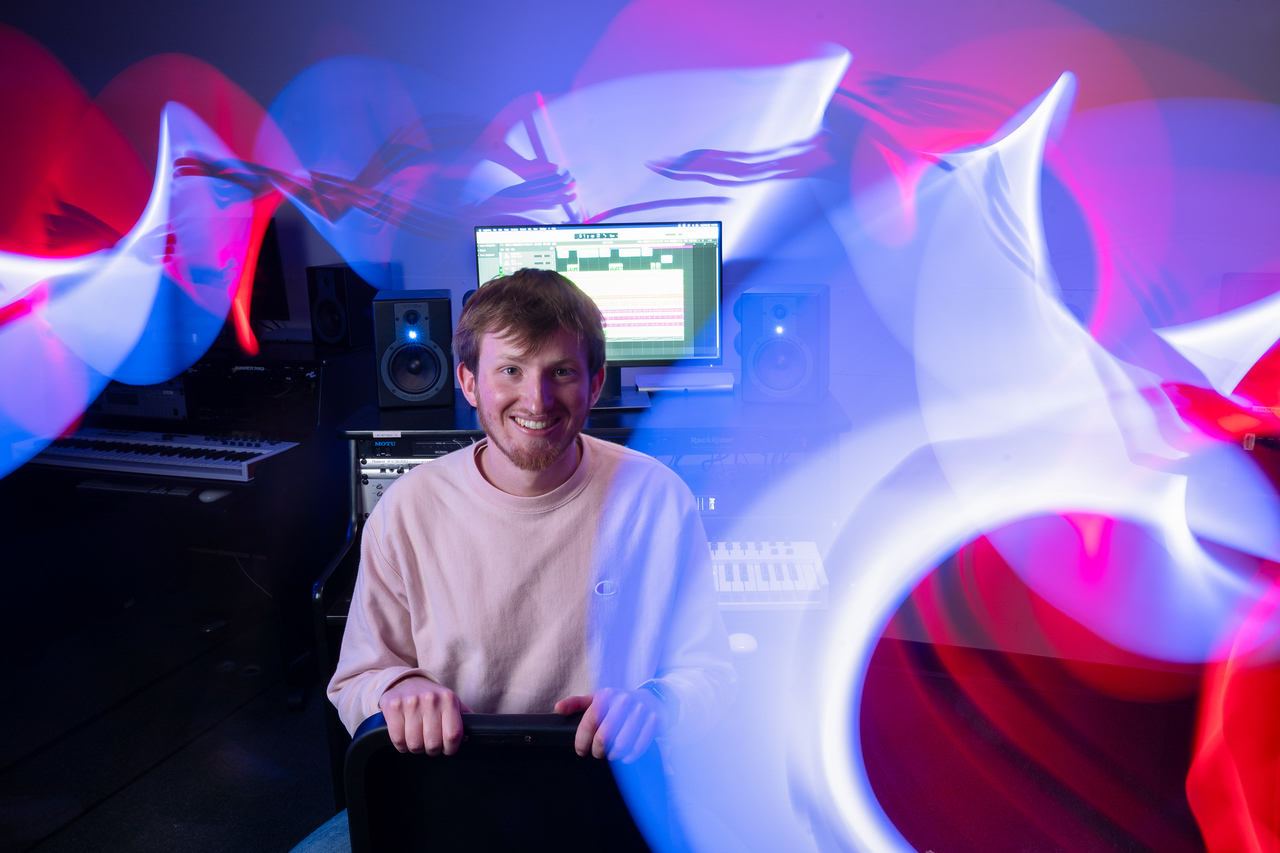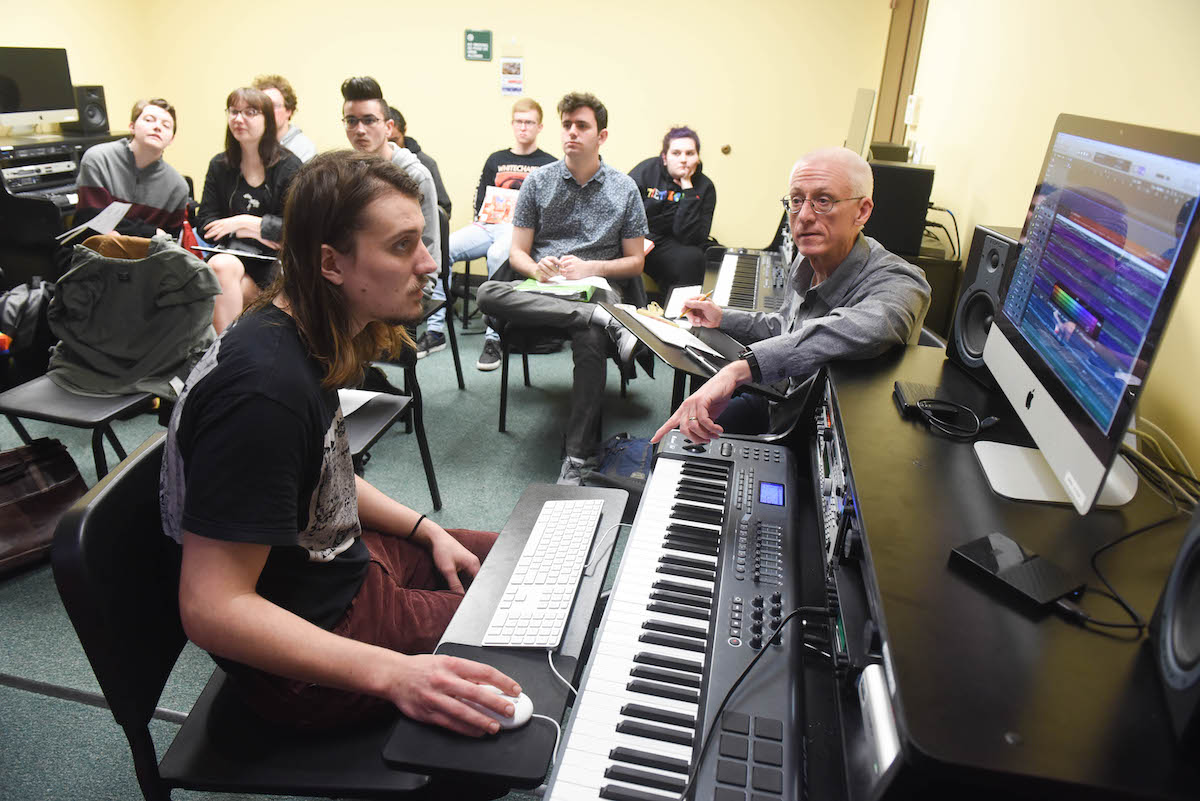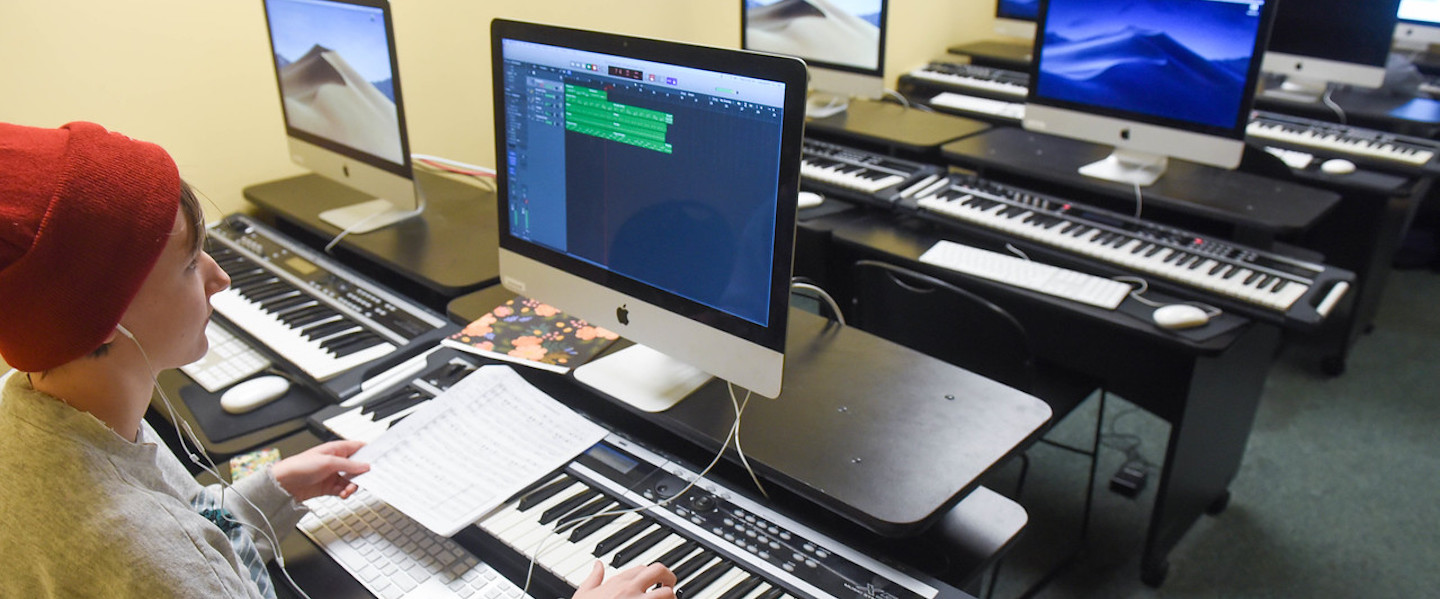Music Tech isn't just producing beats all day or mastering software; it's learning true music composition with technology.
While audio engineering technology majors focus on the engineering of sound – through microphones, capturing sound, recording sound, sound reinforcement, etc – music technology majors focus on musicianship.
“I like to say we are composers, arrangers and orchestrators who happen to use technology as our instrument,” explained Keith Mason, coordinator of music technology. “We are sort of the one-person orchestra who can sit down at a computer and do it all.”
The pandemic, in a strange way, catapulted the “digital musician” to the forefront, as they were some of the few musicians who were able to keep going at the time. “It was those that could sit down at a computer and do whatever they needed to do kept the music business going,” Mason said. “They had the musical training, and the folks that had those kinds of skill sets were able to keep going, putting this type of musician in a very different light.”
Students have been able to add a music technology emphasis to their commercial music major for years. But, recognizing the evolution and vital role of the real-world digital musician in the modern-day music industry, Belmont worked to launch a full-fledged program in music technology three years ago.

For senior music technology major Miles Todd, the program represented a convergence of his interests: creativity, technology and musicality.
Todd shared that he’s been doing music his whole life, tracing his journey from church choirs to electronic music production. Knowing he wanted to pursue a music career, he started at Belmont as a music business major. But, the new offerings in music technology a few years ago piqued his interests and he decided to change his major.
“I don’t really see myself as a traditional performer. I always gravitated toward electronic music, and I started getting into making my own in high school,” Todd said. “Though I had considered being a vocal major with an emphasis in tech, that still wasn’t quite right. I’m more interested in being behind-the-scenes, so this program really stuck out to me.”
Through this program, Todd has been able to explore his own creativity, while still learning business aspects of the industry by keeping music business as his minor. His classes and private lessons have helped him both expand on what he already knew and learn many new skills that have helped him grow tremendously as a digital musician, learning to write music in his program Logic and on sheet music as well as practice arranging for live musicians.
“I've learned about a lot of different genres, though I lean toward EDM-inspired, hip hop-inspired stuff,” Todd explained. “I can take some of these composition principles we learn in class and apply them to that background, whereas a traditional composition major is very centered on what you can get with a traditional orchestra or band. So, this just opens up a whole other side.”
Todd’s favorite classes have been taught by Mason and Carl Rydlund, professor of practice in music technology, who has extensive background composing and arranging in Hollywood, working with Hans Zimmer and the like.
“To those curious about the program, I’d say to just give it a chance. A lot of the things I wasn’t expecting to learn have been the most helpful,” Todd added. “You’ve got to know the rules before you’re able to break them. As I’ve gone through the program, I’ve realized getting this foundational framework is really great to have.”
Todd’s final project for the program is an album he’s been working on, consisting of several original songs and a cover song by one of his favorite sources of inspiration, Daft Punk. Todd will perform the album “Yesterday Belongs to the Dead,” delving into his mental health journey coming into college, at his senior recital, in collaboration with fellow Belmont music students for the performance.
“I'm pretty excited to perform it because it's kind of just been sitting on my computer for the longest time, and normally I'm very shy about performing my stuff for people,” Todd said. “I wanted to push myself. So, I'm excited for it.”
 Belmont's program strikes a balance between rigor and versatility, equipping students with practical skills for freelance careers while fostering a broad understanding of music theory and composition. This specialized focus ensures students receive comprehensive training in musical proficiency alongside a broad general education core.
Belmont's program strikes a balance between rigor and versatility, equipping students with practical skills for freelance careers while fostering a broad understanding of music theory and composition. This specialized focus ensures students receive comprehensive training in musical proficiency alongside a broad general education core.
With this, students are prepared for diverse career paths. Mason emphasized, "We focus on those skill sets that our students need for the diverse opportunities they’ll find in media, film, gaming and live productions.”
Belmont's innovative approach extends to its audition process, pioneering the concept of auditioning on the computer. This forward-thinking pedagogy is complemented by state-of-the-art facilities, including three modern labs equipped to facilitate hands-on learning.
As Belmont's Music Tech program continues to grow, it remains dedicated to shaping future composers, arrangers and orchestrators, equipping students with the technical skills and knowledge to navigate the ever-evolving music landscape with confidence and creativity.

